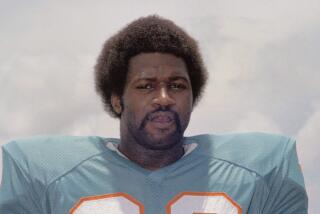Robinson Finally Gets Past His Pain
- Share via
If it isn’t a neighbor, it’s a writer. If it isn’t a student, it’s a Japanese film crew.
Continually nudged to recollect his 1972 Olympic mishap, Rey Robinson has never been close to forgetting any details of the nightmare he experienced 30 years ago.
But he has forgiven.
Robinson, a 20-year-old sprinter from Florida A&M;, was considered a co-favorite with U.S. teammate Eddie Hart to win the 100-meter gold medal in 1972. The three qualifying races to the final were considered formalities for the duo, who months earlier had tied the world record by each running the 100 in 9.95 seconds.
After breezing through a morning qualifier on Aug. 31, Robinson and Hart were due back at Olympic Stadium in Munich later that day for a quarterfinal heat.
They missed the race and were disqualified.
As the infamous story goes, U.S. sprint coach Stan Wright approached Robinson while he was receiving a rubdown in the Olympic village in the afternoon before a heat they believed was to be run in the evening. With Hart and another 100-meter entrant, Robert Taylor, at his side, Wright told Robinson to hurry--they needed to leave for the stadium immediately.
Waiting for a bus, Robinson entered an ABC television studio and inspected a monitor. His 100-meter heat was ready to begin. A graphic listing the entrants had an N/A next to his name for Not Available.
Said Robinson: “It was like being involved in a car accident that’s your fault when you have no insurance and everyone on the freeway is stopped to look at you.”
Initially, Wright accepted blame pointed at him by Robinson and dozens of international media members for relying on an outdated schedule. But in an official report to the U.S. Olympic Committee from U.S. Track and Field team manager George M. Wilson, it was noted that the sport’s governing board, the International Amateur Athletic Foundation, had conducted a technical meeting 48 hours before the heat and decided to change the schedule--moving the 100-meter heats before the three 10,000-meter heats.
Wilson said he was aware of the change, but was distracted by a controversy over the size of poles used by pole vaulters and forgot to inform Wright. Wilson said he believed U.S. coach Bill Bowerman also was aware of the change. Bowerman denied that, leveling criticism at the IAAF for failing to effectively communicate its amended schedule.
Taylor, the father of Philadelphia Eagle defensive back Bobby Taylor, was able to race in his heat and ultimately won a silver medal behind the Soviet Union’s Valery Borzov. Robert Taylor is believed to be residing in Texas. Bobby Taylor’s NFL biography mentioned Robert in 2000, but doesn’t this year, instead noting that he was raised in a single-parent household by his mother, Mary.
Hart, an assistant coach for a junior college track team (Merritt) in Oakland who has applied to replace retired Cal track and field coach Erv Hunt, won a gold medal in 1972 as a member of the 400-meter relay team.
Wright, elected to the National Track and Field Hall of Fame in 1993, died at age 78 in 1998.
Robinson, 50, did not attend Wright’s funeral, but he said he no longer blames the coach for the incident.
Robinson has been men’s track and field coach at Florida A&M; for three years, leading the team to two Mid-Eastern Athletic Conference championships.
More to Read
Go beyond the scoreboard
Get the latest on L.A.'s teams in the daily Sports Report newsletter.
You may occasionally receive promotional content from the Los Angeles Times.







